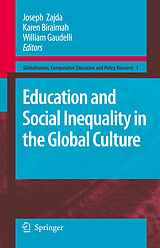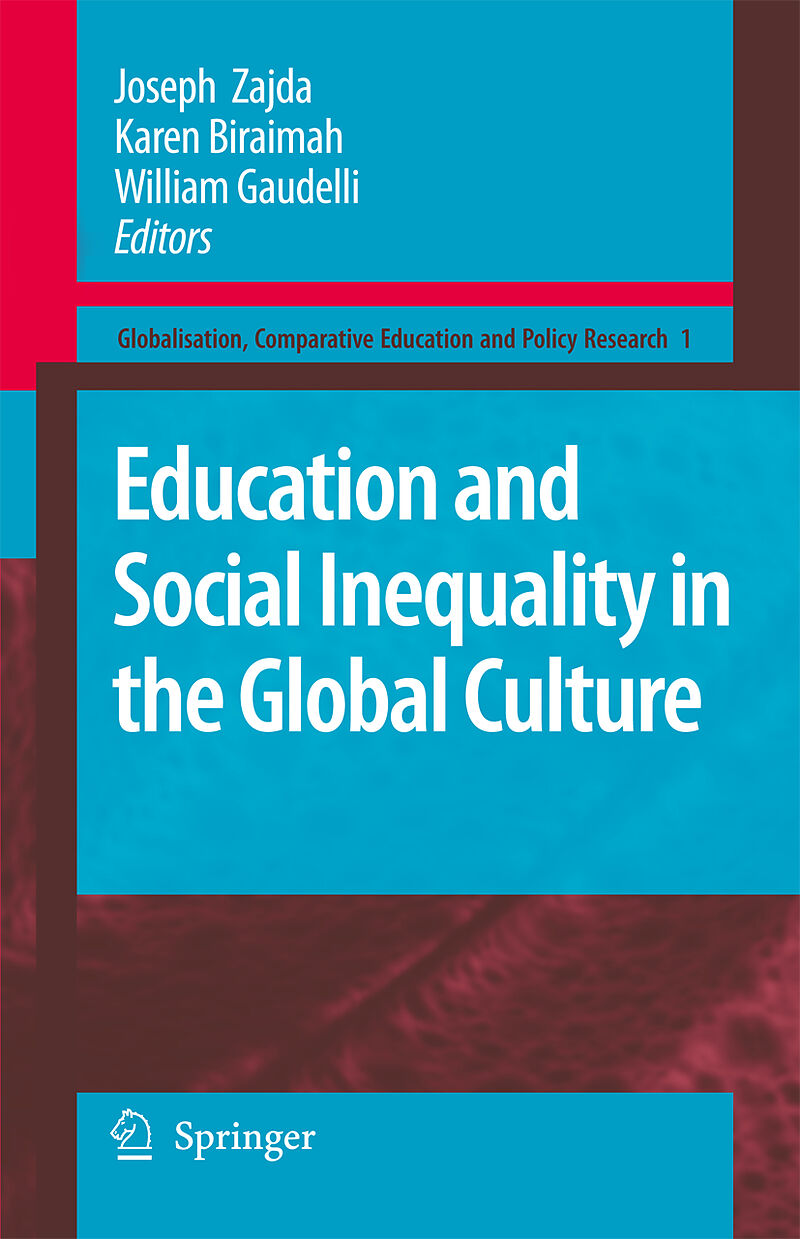Education and Social Inequality in the Global Culture
Einband:
Fester Einband
EAN:
9781402069260
Untertitel:
Globalisation, Comparative Education and Policy Research 1
Genre:
Pädagogik
Herausgeber:
Springer Nature Singapore
Auflage:
2008 edition
Anzahl Seiten:
212
Erscheinungsdatum:
01.04.2008
ISBN:
978-1-4020-6926-0
A major aim of Education and Social Inequality in the Global Culture, which is the first volume in the 12-volume book series Globalisation, Comparative Education and Policy Research, edited by Joseph Zajda and his team, is to present a global overview of the relationship of education, socio-economic status, and globalization. By examining some of the major education policy issues, particularly in the light of recent shifts in education and policy research, the editors aim to provide a comprehensive picture of the intersecting and diverse discourses of globalization, education, and policy-driven reforms. The spirit of dialogical encounter has very soundly directed editors' efforts in organizing this volume. The editors' task is to deepen, and in some cases open widely, diverse and significant discourses related to globalization, social stratification, and education. The impact of globalization on education policy and reforms is a strategically important issue for us all. More than ever before, there is a need to understand and analzse both the intended and the unintended effects of globalization on e- nomic competitiveness, educational systems, the state, and relevant policy changesall as they affect individuals, educational bodies (such as universities), policy-makers, and powerful corporate organizations across the globe. The evo- ing and constantly changing notions of national identity, language, border politics and citizenship which are relevant to education policy need to be critiqued by appeal to context-specific factors such as localregionalnational areas, which sit uncomfortably at times with the international imperatives of globalization.
Explores conceptual frameworks and methodological approaches applicable in the research of the State, globalisation and social inequality Examines central discourses surrounding the debate of cultural capital and social inequality in education Illustrates how the relationship between the State and education policy affects current models and trends in schooling globally Demonstrates ideological imperatives of globalisation, neo-liberal ideology and the State Evaluates the ambivalent and problematic relationship between the State, education reforms and outcomes in education globally
Klappentext
The book critically examines the overall interplay between globalisation, social inequality and education. It draws upon recent studies in the areas of globalisation, educational inequalities and the role of the State. It explores conceptual frameworks and methodological approaches applicable in the research covering the State, globalisation, social stratification and education. It demonstrates the neo-liberal ideological imperatives of education and policy reforms, and illustrates the way the relationship between the State and education policy affects current models and trends in education reforms and schooling globally. Various book chapters critique the dominant discourses and debates pertaining to the newly constructed and re-invented models of neo-liberal ideology in education, set against the current climate of growing social stratification and unequal access to quality education for all. The book, constructed against this pervasive anti-dialogical backdrop, aims to widen, deepen, and in some cases open, discourse related to globalisation, and new dimensions of social inequality in the global culture. It is presented around three particular dimensions: hegemony, equity, and cultural capital, as these continue to be most significant dimensions defining social inequality in the global culture. The book explores the ambivalent and problematic relationship between the State, globalisation and social change. Using a number of diverse paradigms, ranging from critical theory to globalisation, the authors, by focusing on globalisation, ideology and social inequality, attempt to examine critically both the reasons and outcomes of education reforms, policy change and transformation and provide a more informed critique on the Western-driven models of accountability, quality and school effectiveness. The book draws upon recent studies in the areas of equity, cultural capital and dominant ideologies in education. It examines the overall interplay betweenglobalisation, ideology and social inequality in education.
Inhalt
Global Convergence and Divergence in Childhood Ideologies and the Marginalization of Children.- Measuring Inequities in Secondary School Attendance: The Probability of Attending Secondary School for Primary School Graduates in Nicaragua.- Religion, International Aid, and Used Clothing: Globalization and Mayan Literacy Revival in Guatemala.- A New Understanding of Globalization: The Case of the Romà.- Equity Considerations in the Access to Higher Education in Central and Eastern Europe.- The Process of Inclusion/Exclusion in Brazilian Schools: Data from Reality.- Private Resources in Educational Finance and Equality Implications: Evidence from Peru.- Defying the Odds: A Study of Grade 11 Female Students in Eritrea.- Voices of Teachers in Academic and Vocational Secondary Schools in Egypt: Perceived Consequences of Educational Reform for Quality and Equality.- Cultural Capital: What Does It Offer Students? A Cross-National Analysis.- The Institutionalization of Mass Schooling as Marginalization or Opportunity in Islamic Nation-States.

Leider konnten wir für diesen Artikel keine Preise ermitteln ...
billigbuch.ch sucht jetzt für Sie die besten Angebote ...
Die aktuellen Verkaufspreise von 6 Onlineshops werden in Realtime abgefragt.
Sie können das gewünschte Produkt anschliessend direkt beim Anbieter Ihrer Wahl bestellen.
Loading...
Die aktuellen Verkaufspreise von 6 Onlineshops werden in Realtime abgefragt.
Sie können das gewünschte Produkt anschliessend direkt beim Anbieter Ihrer Wahl bestellen.
| # | Onlineshop | Preis CHF | Versand CHF | Total CHF | ||
|---|---|---|---|---|---|---|
| 1 | Seller | 0.00 | 0.00 | 0.00 |
